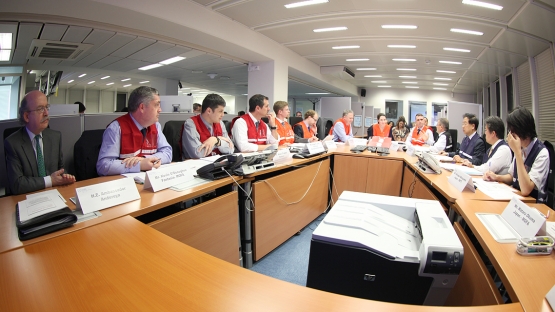Radioactive cargo, such as irradiated nuclear fuel and radioactive waste, is often shipped by sea for long haul destinations. Maritime shipping is a safe and effective mode of transport, and an emergency at sea is highly unlikely. Nevertheless, policymakers have increasingly become aware of the need to be prepared for such a low probability event. A tabletop exercise held at the IAEA this week allowed experts from 17 countries to practice international cooperation in the event of a nuclear emergency at sea.
In recent years, coastal and shipping states have jointly developed voluntary guidelines and best practices related to the potential transboundary effects of a maritime transport emergency. In order to enhance transparency and information exchange, in particular through advance notification, a group of States with an interest in nuclear maritime transport established the Coastal State-Shipping State Dialogue as an informal consultation mechanism in the early 2000s.
During this week’s exercise members of the Coastal State-Shipping State Dialogue modelled international cooperation in such an emergency.
“This exercise contributes to the main objective of the informal Dialogue between Coastal and Shipping States, which is to build confidence and promote transparency among our countries,” said Ambassador Armin Andereya, Permanent Representative of the Republic of Chile to the International Organizations in Vienna and Chairman of the Dialogue.
Until the late 1990s, little information was available to Coastal States on the cargo crossing their waters. However, they were still expected to meet national and international standards with regard to emergency processes. The Convention for the Safety of Life at Sea (SOLAS), for instance, requires the nearest Coastal State to assist any vessel in its proximity asking for assistance regardless of its cargo.
Now some of the Dialogue’s results, especially the exchange of information during an emergency at sea, have been tested through a tabletop exercise.
The scenario played out at the IAEA’s Incidence and Emergency Centre involved the transport of vitrified radioactive waste by sea. A diplomatic demarche prior to the shipment was simulated following the best practices agreed on by the Dialogue. Participants, as players and observers, included representatives from Argentina, Australia, Chile, Colombia, Dominican Republic, France, Ireland, Japan, Malta, New Zealand, Norway, Portugal, the Russian Federation, Spain, Turkey, the UK and the USA. Representatives from the World Nuclear Transport Institute (WNTI) were also present.
The exercise also focused on compliance with standards and guidelines, including the IAEA’s Regulations for the Safe Transport of Radioactive Materials, and with the SOLAS Convention.
“I am encouraged by the positive evolution of the informal Dialogue between Coastal and Shipping States in the last couple of years, enhancing mutual understanding, information sharing and practical arrangements for transport,” said Ambassador Mitsuru Kitano, Permanent Representative of Japan to the International Organizations in Vienna and prospective Chair of the Dialogue. “I cannot emphasize more the benefits of the exercise in testing the effectiveness of government-to-government communications in response to unexpected events, and I am confident that valuable lessons will be drawn from it.”
The objectives of the tabletop exercise included:
- Reviewing best practices for Government to Government voluntary communications regarding the transport of MOX fuel, high level radioactive waste and irradiated nuclear fuel by sea;
- Reviewing the effectiveness of Government to Government communication channels in the case of an event occurring during maritime transport of nuclear and radioactive materials;
- Reviewing to what extent the information made available during the exercise allows Governments to deliver appropriate and timely information to the public.
One of the major objectives of the Dialogue is to ensure that the best international practices are employed in every circumstance, thereby helping to raise confidence by addressing potential risks and concerns. During the concluding discussion, participants and observers agreed that this exercise contributed substantially to this objective, and that they would continue to reflect on the lessons learned from the exercise.


